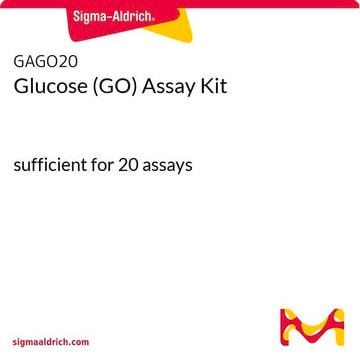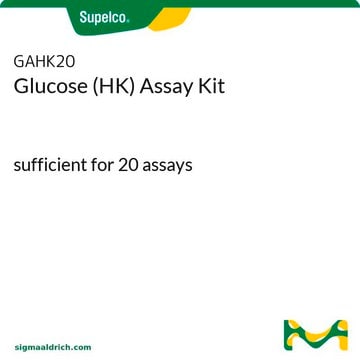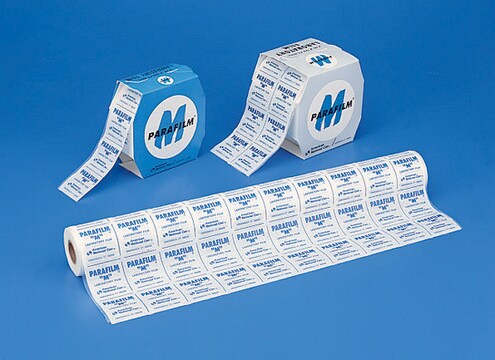MAK489
Glucose Uptake Assay Kit
sufficient for 100 fluorometric tests
Synonym(s):
Glucose Uptake Assay Kit
Sign Into View Organizational & Contract Pricing
All Photos(1)
About This Item
UNSPSC Code:
12161503
NACRES:
NA.84
Recommended Products
Quality Level
application(s)
pharmaceutical
detection method
fluorometric
relevant disease(s)
endocrinological disorders, diabetes; cancer
shipped in
wet ice
storage temp.
−20°C
Related Categories
General description
Glucose uptake has a variety of methods and transporters and depends upon the metabolic demand of the cell type and availability of glucose. There are over ten different facilitated diffusion glucose transporters which transports glucose down its concentration gradient without ATP hydrolysis. In the kidneys, secondary active transport is used to uptake glucose against its concentration gradient to ensure that very little glucose is excreted in urine.
Features and Benefits
- Linear detection range: 0.1 µM to 5 µM 2-DG6P
Suitability
The kit is suitable for the determination of glucose uptake in whole cells and the evaluation of effects of ligands or drugs on glucose transport.
Principle
The Glucose Uptake Assay Kit is a fluorescent cell-based assay that uses 2-deoxyglucose (2-DG), a widely used glucose analog because it can be taken up by glucose transporters and metabolized by endogenous hexokinase, into 2-deoxyglucose 6-phosphate (2-DG6P). 2-DG6P accumulates intracellularly because it is not a suitable substrate for phosphoglucose isomerase, the next step in glycolysis. The cells are lysed, and excess NADP and glucose 6-phosphate dehydrogenase (G6PDH) is added to metabolize 2-DG6P and generate a molar equivalent amount of NADPH. The NADPH is then measured using a G6PDH recycling reaction to amplify the signal and generate a fluorescent signal measureable at λEx = 530 nm/λEm = 585 nm proportional to the concentration of 2-DG6P.
signalword
Danger
hcodes
Hazard Classifications
Eye Dam. 1 - Met. Corr. 1 - Skin Corr. 1B
Storage Class
8A - Combustible corrosive hazardous materials
wgk_germany
WGK 3
Choose from one of the most recent versions:
Certificates of Analysis (COA)
Lot/Batch Number
Don't see the Right Version?
If you require a particular version, you can look up a specific certificate by the Lot or Batch number.
Already Own This Product?
Find documentation for the products that you have recently purchased in the Document Library.
Our team of scientists has experience in all areas of research including Life Science, Material Science, Chemical Synthesis, Chromatography, Analytical and many others.
Contact Technical Service


![2-Deoxy-2-[(7-nitro-2,1,3-benzoxadiazol-4-yl)amino]-D-glucose ≥97% (HPLC)](/deepweb/assets/sigmaaldrich/product/structures/104/527/40bd5a41-ebc4-484e-a10e-891fecfaea79/640/40bd5a41-ebc4-484e-a10e-891fecfaea79.png)

